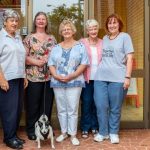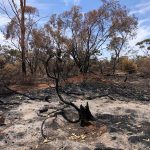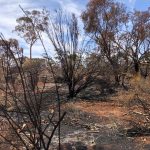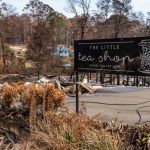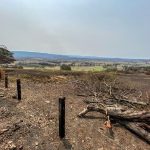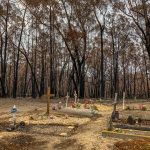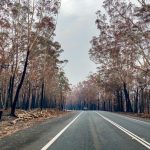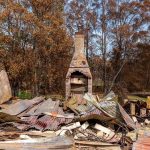This summer’s bushfire season has left Australia damaged and sore. In true community spirit, we’ve also seen some amazing stories of people coming together to volunteer their time, donate their money, and support each other in harsh times of need.
The Uniting Church in Australia has been, and continues to, provide a range of support for people and communities affected by devastating bushfires around the country – both in crisis care and long-term recovery. In the first 11 days of 2020, 63 Uniting Church chaplains were engaged at 36 bushfire crisis centres. Together they volunteered 1 677 hours of chaplaincy with people directly affected by the fires, some of them experiencing the worst days of their lives.
Rev Dr Stephen Robinson is the Assembly Disaster Recovery Officer for the Uniting Church in Australia. His role in this bushfire season has been to work with Uniting Church disaster response co-ordinators in each Synod to provide support and resources. He is also the Co-ordinator of the Disaster Recovery Chaplaincy Network in NSW, an ecumenical network.
“That role in particular is extremely busy because for every evacuation centre, recovery centre or disaster assistance point, they’ve wanted chaplains from our network,” he said. “And this particular emergency has been way more than ever could have been imagined, let alone experienced, before in the state’s history.
“The most centres we’d opened in the ten years before this, perhaps ever, would have been about five evacuation centres. During this last fire emergency, we’ve had over 15 centres, in five different major locations.”
Stephen said chaplains in this network have provided amazing support for people in the initial stages of bushfire coming through a community.
“The chaplains themselves in Victoria, New South Wales, and also in the Adelaide hills, they’ve been engaged in evacuation centres and recovery centres. They come alongside people – and so many of them have lost everything they own.
“One chaplain said it’s not unusual to talk to 20 people in a day who’ve lost all that they own. So that’s the level of the intensity of the work they’re doing.
“There are other agencies like Red Cross who are on the ground in those centres too, but the most distressed and most upset people tend to be passed on to our chaplains.
“There is an enormous level of need in terms of calming and mental health care. In the very intensity of it there were not enough mental health workers, so quite often chaplains will stand in that space – and do a very good job, mainly in calming, grounding, and supporting.
“Sometimes it’s information that people need, or connection with people. Or it might be just getting hold of medication.”
Stephen said that as well as this general crisis support, the chaplains in this network also support people as they journey through realising all they have lost.
“Another important function of the chaplains is that they help people to comprehend the loss and go beside them in the grieving,” he said. “We’ve had people on the ground as people go back to walk through the ruins; to be alongside them to talk. We are part of all those outreach things that happen after these fires.
“That’s a really important role because it’s not so much about talking to people, though we’re open to listening to what they have to say, it’s more about just being beside them in a pastoral presence.
“There’s been so many houses lost and also stock. Farmers have had to shoot most of their stock, and the devastation, not only of having gone through a very big drought where they’re trying to keep these poor animals alive – and they’ve just about gone broke doing that – now what’s left has been burnt out.
“It’s a terrible situation. These chaplaincies are really important in the church being relevant to people.”
Chaplains also support ministers in locally affected areas and help resource them on how to support their local communities. Locally, Pastor Lindsay Ginn, the newly commissioned Uniting Church WA Bush Chaplain in the Remote Area Ministry, Goldfields Patrol, began his role in January this year. He immediately travelled to the Esperance region to meet people who have been affected by bushfires there, and consider where he will focus his support.
“My role for this trip was just basically to get to know my area,” he said. “It was my first trip down to Esperance, so it was good to see these little towns and to start meeting people. I want to get to know the locals and find out where the need is and where we can help.”
While no houses or lives in that area were lost, he said some towns were surrounded by fires. The smoke and ash from the fires seeped into some water tanks, turning the water black and tarnishing the taste.
“The first place that I stopped at was Kambalda, which is about 50kms south of Kalgoorlie. I spoke to one of the business people there. She still seemed quite traumatised by it, almost as if I had reminded her of a nightmare, which I guess it was.
“She said she would never want to see anything like that again, it was very frightening. They could see the thick smoke coming towards the little township of Kambalda. Thankfully it didn’t reach there, and she was extremely grateful that all the community helped in stopping it.
“Another gentleman I spoke to in Norseman said that on one particular day the whole town was surrounded by smoke and fires burning on each side.
“The worst one was coming from the south and it was really placing the town in a lot of danger, so people were preparing to evacuate and get out of there. But then the wind changed direction just in time and blew it all away, which they are very thankful for.
“We’re not talking little fires, these were massive fires. I could see as I was driving down all the black from where the fire had come up to the road and crossed the road.”
Lindsay said the community in these areas is doing well and working together to get their lives back on their feet.
“I will certainly have my ears open and I’ll be making more enquiries to see where the need is,” he said. “I’ll be travelling this highway quite regularly, so I will keep checking in on how they’re doing and establishing contact there.”
The Uniting Church in Australia National Disaster Relief Fund is available for people to donate to, and for Uniting Church congregations and communities to access to provide support within their communities. The fund also helps to resource the National Disaster Recovery Officer, to deploy ministry agents to disaster zones, contribute to long-term recovery projects, and provides direct support to community members affected by disaster.
Rev Dr Stephen Robinson said it’s important to be in it for the long haul. Ongoing support is vital, as recovering from bushfires of this scale will be a long process, possibly covering a number of years.
“When it’s out of the newspaper and everyone goes home and there’s another crisis that’s on the TV or the radio, people forget about the ones that are left behind that still haven’t got their house cleaned up or another one built,” Stephen said. “And it takes months or years.
“The danger is that we go with the news cycle and are only conscious of the needs of people right now.
“The recovery is actually the difficult and awkward thing to try and resource. That’s why we make a real effort to make sure that the church stays in there with people.
“We want to stay there for the long run as much as we can.”
The Uniting Church WA also has a Disaster Relief Fund available for this purpose. While, at the time of going to print, WA has been less affected than our eastern states this year, the fund is available for support if the need arises. Rev David Jackson, Convenor of the Disaster Relief and Community Recovery Committee, said the committee hasn’t had to respond to any disasters in WA related to bushfires yet this season, as the Government response, and response from other agencies such as the Red Cross and YouthCARE, have been adequate. This fund, like the Assembly fund, is there for a long-term focus of recovery.
The Disaster Relief Fund has helped a number of WA communities after a disaster, including most recently Margaret River. After violent murders that shocked the region, Margaret River Uniting Church applied to the fund to engage a local artist in running a community building activity for the benefit of the whole town. They also ran a festival engaging with the community, The Deep Listening Festival.
When a disaster or crisis emerges in a community, the Disaster Relief and Community Recovery Committee contact the Uniting Church congregation in that location and offer peer support throughout the journey.
“Usually it’s from that contact that people are made aware of the funds that could be available should they need it; for healing and help to that local community,” David said. “These disasters are not over and done with when everyone shuts up and everyone departs the scene. The people that are left behind are the ones to continue to recover from significant events.”
In WA, people are also invited to take part in the Disaster Recovery Chaplaincy Training, which will be happening in May. This ecumenical and interfaith training is being organised through the Council of Churches WA, and will be led by Rev Dr Stephen Robinson. In April last year, 51 people from WA Christian denominations around the state took part in the training, and David is hoping for another 50 people to become trained in this specialised type of chaplaincy, joining the WA Disaster Recovery Chaplaincy Network.
Once trained, these chaplains would be available to provide pastoral care in a disaster or emergency setting, should a situation arise. Their role is to stand alongside people, listen to them, attend to what is needed and refer people to further services.
“We’re attentive to the individual needs within the framework of our experience as pastoral carers,” David said. “So we would refer people that we would consider needing other professional assistance if that was required.
“We know the land we’re in and respect that and refer on anyone who we think will need particular professional assistance.”
As the country begins to recover from this bushfire season, Stephen Robinson wants those who have not been impacted by the flames to know that their support and prayers are being felt.
“I would hope [people] wouldn’t be overwhelmed by it, because I think the scale of this is so big it could be overrun with the grief and the size of it,” he said. “Know that there are lot of people who are really positively engaged in these things and they’re really making a big difference. Know that their prayers are really important, and even words of support from one church to another is extremely helpful and can really lift spirits at the right time.
“Gifts of prayer or connection and money actually do make a difference.
“The Uniting Church is doing some amazing stuff and nationally has got a real name for engagement in the disaster recovery space.”
How you can help
- Cash donations are preferred in a crisis, as there are often not enough resources to store and distribute donations of goods. You can help by donating to the Uniting Church in Australia National Disaster Relief Fund online at assembly.uca.org.au/national-disaster-relief-fund
- Donate to the Uniting Church WA Disaster Relief Fund, to support local communities after a crisis, by depositing funds to:
Account name: Uniting Church Investment Fund
BSB: 036-001
Account: 921789
Reference: WA Disaster Relief - Target Australia and UnitingCare Australia have also teamed up for a bushfire appeal. Target have announced they will match donations dollar for dollar. Donations can be made in Target stores, or online at target.com.au/targetbushfirereliefappeal
- Disaster Recovery Chaplaincy Training will be held from Monday 25 to Thursday 28 May, at Noranda Uniting Church. Anyone in a pastoral caring role in the church, who has support from their denomination or faith body, can train to become a Disaster Recovery Chaplain, in preparation for disaster situations that may arise in WA. For more information contact Rev David Jackson at de.jackson@bigpond.com.
- For those not involved in a pastoral care role with their church or faith body, volunteers are also required in a number of capacities, such as with the Red Cross, volunteer firefighters and many other community groups. There are lots of ways to help out where it’s needed, so if this is your thing, find a group to connect with and get involved.
Heather Dowling
Top image: In Bateman’s Bay, NSW, bushfires have been devastating to the land and properties.

